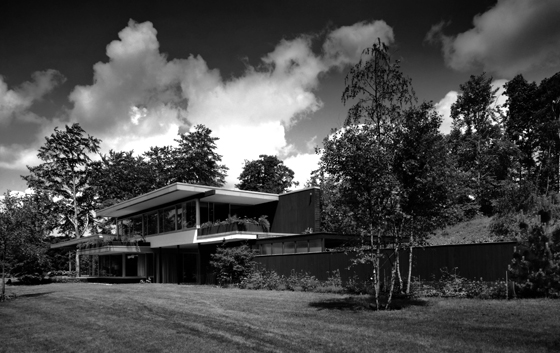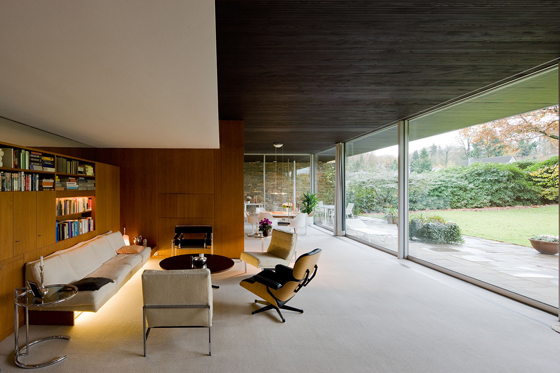Exhibition: Richard Neutra in Europe (1960–1970)
Texte par Susanne Fritz
Suisse
07.07.10
Between 1960 and 1970, so in just ten years, the American architect Richard Neutra (*1892 in Vienna, †1970 in Wuppertal) had eight villas constructed in Europe; four in Switzerland (one of which was the only one to be built without a flat roof), three in Germany and one in France. .
Portrait Richard Neutra, 1963, photo: Klaus Meier-Ude
Large, custom-built models, specifically for display purposes and of all of Richard Neutra’s ten buildings, are flanked by large-spread photographs and a wealth of plans, drawings, historical photographs and further documents from the estate in Los Angeles in order to bring to light a new and important chapter in European architectural history. With the Austrian-born Richard Neutra, a pupil of Adolf Loos, the modern age took a turn back to Europe and formed the basis of a series of almost iconic pictures of an architectonic “American way of life” here. In Switzerland after 1945, as well as in West Germany during the post-war period, Richard Neutra assumed a central role in European building work, even if he was still referred to as “famous amongst connoisseurs” (Manfred Sack) in 1994.
Richard Neutra Haus Rentsch, 1964 © Department of Special Collections, Charles E. Young Research Library, UCLA
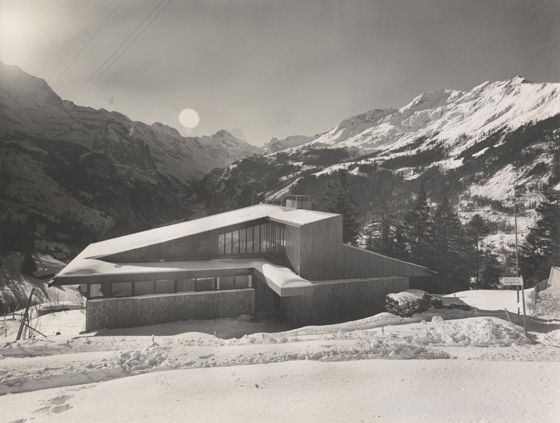
Richard Neutra Haus Rentsch, 1964 © Department of Special Collections, Charles E. Young Research Library, UCLA
×Richard Neutra Haus Rentsch, 1964 © Department of Special Collections, Charles E. Young Research Library, UCLA
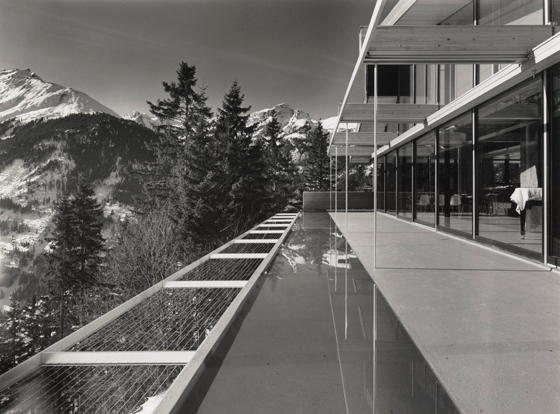
Richard Neutra Haus Rentsch, 1964 © Department of Special Collections, Charles E. Young Research Library, UCLA
×Borrowings from the high-quality design context such as kitchen parts from Poggenpohl and Miele, chairs and sofas from Mies van der Rohe, Ray and Charles Eames, Henry Bertoia or Eero Saarinen; or even Neutra originals like the fireside companion set and a settee complement a display in the form of historical documentation, which interprets the living atmosphere in a contemporary manner and therefore offers a topical forum to the debate over the modernistic domestic architecture of the Sixties.
Richard Neutra Casa Ebelin Bucerius, Brione sopra Minusio, Switzerland (1962-66), photo: F. Maurer, Zurich © Department of Special Collections, Charles E. Young Research Library, UCLA
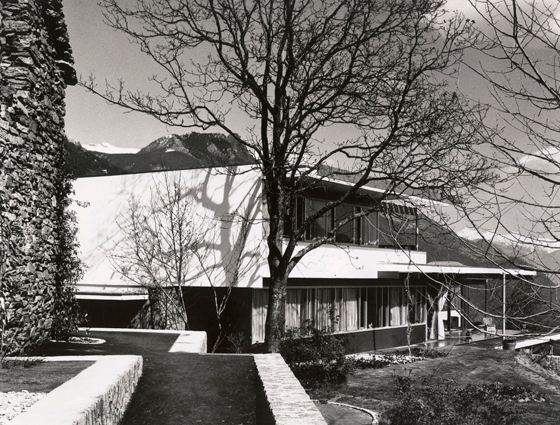
Richard Neutra Casa Ebelin Bucerius, Brione sopra Minusio, Switzerland (1962-66), photo: F. Maurer, Zurich © Department of Special Collections, Charles E. Young Research Library, UCLA
×Casa Ebelin Bucerius, Brione sopra Minusio, Switzerland (1962-66), main entrance, photo: Alberto Flammer, Locarno © Department of Special Collections, Charles E. Young Research Library, UCLA
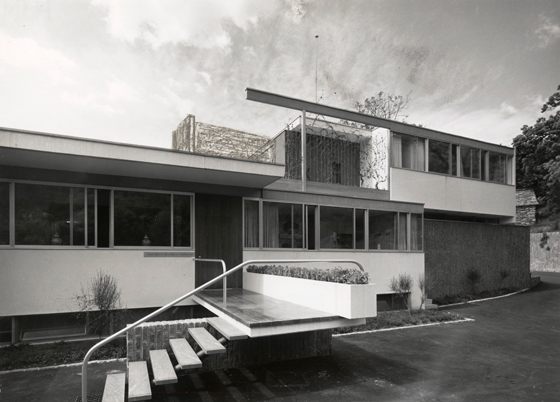
Casa Ebelin Bucerius, Brione sopra Minusio, Switzerland (1962-66), main entrance, photo: Alberto Flammer, Locarno © Department of Special Collections, Charles E. Young Research Library, UCLA
×Richard Neutra Casa Ebelin Bucerius, Brione sopra Minusio, Switzerland (1962-66), photo: Martin Hesse © Department of Special Collections, Charles E. Young Research Library, UCLA
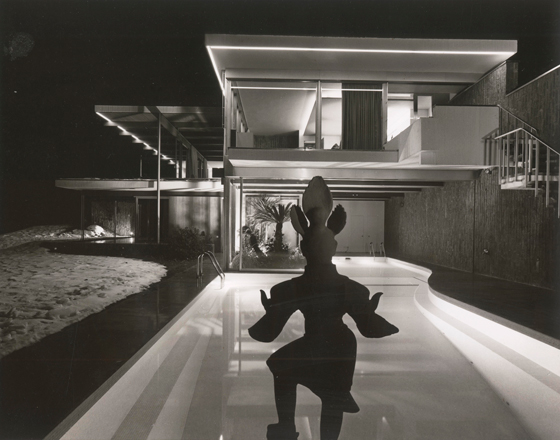
Richard Neutra Casa Ebelin Bucerius, Brione sopra Minusio, Switzerland (1962-66), photo: Martin Hesse © Department of Special Collections, Charles E. Young Research Library, UCLA
×Richard Neutra Casa Ebelin Bucerius, Brione sopra Minusio, Switzerland (1962-66) Terrace with panoramic view on Lago Maggiore, photo: Martin Hesse © Department of Special Collections, Charles E. Young Research Library, UCLA
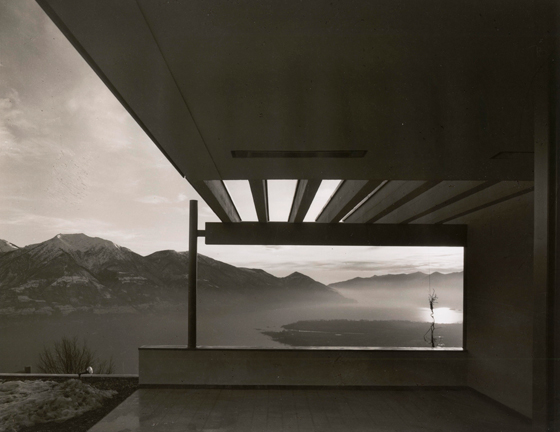
Richard Neutra Casa Ebelin Bucerius, Brione sopra Minusio, Switzerland (1962-66) Terrace with panoramic view on Lago Maggiore, photo: Martin Hesse © Department of Special Collections, Charles E. Young Research Library, UCLA
×With regard to the catalogue, an extensive publication which documents the works of Richard Neutra established in Europe between the years 1960–1970 is expected. The project initiator, Klaus Leuschel, and his team (Hubertus Adam, Joachim Driller and Lilian Pfaff) are going to present in detailed essays the current state of progress with regard to the building projects at an accessible level. They will also deal with current and historic architectural photos, original drawings and plans, delineations, documents and a data synopsis in order to put together a well-written and illustrated book.
The project will be completed for 2010, the 40th anniversary of the death of the architect, as a travelling exhibition in Switzerland, Austria and the USA. Talks with various renowned institutions are currently taking place in order to find a buyer.
Richard Neutra Haus Kemper photo: Karl-Hugo Schmölz © Horst Glaeser, www.waldehuth.de
Richard Neutra Haus Pescher, photo: © Iwan Baan, Amsterdam
Completed architectural projects
BEWO Estate I (Mörfelden-Walldorf/D), 1960
Neutra’s first project to be completed in Europe after World War II: a dense estate of detached houses near Frankfurt Airport, now partly spoiled by subsequent alterations.
Rang House (Königstein, Taunus/D), 1961
Small detached house built in a woodland clearing on the outskirts of Königstein for a professor at the University of Frankfurt. Although largely preserved in its original state, it needs refurbishing.
Grelling House – Casa Tuja (Ascona/CH), 1963
At the foot of Monte Verità (‘mountain of truth’) above Ascona. The house was built as a holiday home for an industrialist who also planned a large commercial property in Zurich with Neutra, although it was never built. Casa Tuja has been preserved unaltered.
Rentsch House (Wengen/CH), 1964
Built on the outskirts of Wengen with an impressive view of the Eiger-Mönch-Jungfrau mountain range. Originally designed with a flat roof, Neutra was forced by planning officials to add a gabled roof, lending the building a unique position in his oeuvre.
BEWO Estate II (Quickborn/BRD), 1965
Neutra built his second (of a planned three) estates in Quickborn, north-west of Hamburg. Although the buildings’ design is similar to that in Walldorf near Frankfurt, this listed estate is in better condition than its predecessor.
Bucerius House (Brione/CH), 1966
High above Lake Maggiore, House Bucerius has a breathtaking view exploited by Neutra to the full. This huge villa, which cost a small fortune to build, was the most elaborate ever erected by Neutra in Europe and can be regarded as a milestone of his later work. It has been painstakingly and exquisitely restored and renovated by its current owner.
Kemper House (Wuppertal/BRD), 1967
This discretely located villa would probably have harboured a potential similar to that of House Bucerius built the previous year, were it not for its much less sunny location and the interior changes, which had local heritage officials up in arms.
Pescher House (Wuppertal/BRD), 1968
The house to have been best preserved in its original condition apart from Rentsch House.
Delcourt House (Croix/F), 1969
Neutra’s only house in France was built in a suburb of Lille for an erstwhile colleague and her husband. These days it is surrounded by a high wall.
Stettfurt House (Thurgau/CH), 1970
Begun by Richard Neutra as a low-budget project, drawn by his son Dion, and completed (after an interlude when the financing dried up) by a Swiss architect who had previously worked with Neutra. Even so, a few months before he died, Neutra requested in a letter to be referred to as the building’s original designer.
Publisher: Klaus Leuschel und Marta Herford, authors: Hubertus Adam, Joachim Driller, Lilian Pfaff DuMont Verlag Köln 272 pages
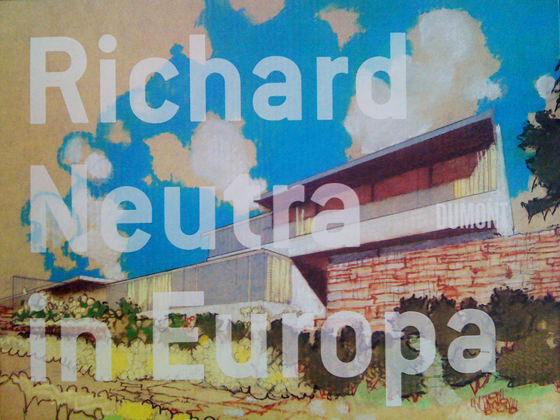
Publisher: Klaus Leuschel und Marta Herford, authors: Hubertus Adam, Joachim Driller, Lilian Pfaff DuMont Verlag Köln 272 pages
×Catalogue published by Klaus Leuschel in association with MARTa Herford
Text contributions by, among others, Hubertus Adam, Joachim Driller, Lilian Pfaff, Michael Kröger and Roland Nachtigäller
Pages: 272
Format: approximately 30 x 22 cm
Price: approximately €34 Euro in the museum, €39.95 in bookshops
Text: German/English
Publisher: DuMont Buchverlag Cologne
ISBN: 978-3-8321-9286-0
Richard Neutra in Europa – Bauten und Projekte 1960–1970
Herford exhibition dates: 8 May to 1 August, 2010
Swiss Architecture Museum Basel exhibition dates: 20 August to October, 2010
Art director: Roland Nachtigäller
Visiting curator: Klaus Leuschel (Zürich)
Scientific curator: Michael Kröger, MARTa Herford
Scientific team: Dr. Hubertus Adam (Zürich)
Dr. Joachim Driller (Wuppertal)
Lilian Pfaff (Los Angeles)
In association with: Dion Neutra, Los Angeles
University of California, UCLA Library, Department of Special
Collections,
Management of Neutra-Constructions in Europe,
Prof. Dr. Roland Günter, Oberhausen








